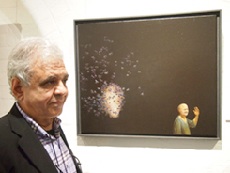Mohammed Djazmi
Artist’s Statement:
I was born in the north-eastern Iranian town of Bojnourd in 1948 into an artistic family, with a grandfather who sculpted and a father who was a well-known local painter.
I learnt to paint from childhood under my father's tuterledge and had my first exhibition at 14, when my paintings were displayed alongside those of Bojnourd's other artists. Three years later, during my school holidays, I went to Tehran where I met the famous Iranian realist painter, Tikran Bazel. I started a drawing course at Bazel's studio and the next year, moved onto a painting course at the same studio. I stayed in Tehran for my university education, studying at The College of Decorative Arts (now Tehran Art University). There, I became interested in the techniques of various masters like Cezanne, Monet, and became Bazel's assistant tutor, eventually teaching my own private drawing classes.
In 1974, after I'd completed my studies and military service, I became the art expert at the Anthropology Centre of Iran. Ten years later, in 1984, I moved to Britain with my wife and two sons, where I was granted an Artist's Visa and where I have lived since, working as a full- time artist.
This page has been updated following the sad passing of the artist.
Please click the links below to view his past exhibtions.




In memory of
Mohammed Djazmi
March 2016
My friend and talented artist Mohammed Djazmi passed away in March 2016 after a long struggle with his health.
Mohammed would want to be remembered for his campaign against corruption and repression in in his birth country of Iran so please visit the pages on this website, which represent his passions at the most insistent and powerful.
Mohammed exhibited regularly at Williams Art’s Gwydir Street gallery, and for me it was one of the absolute highlights: his exhibitions were serious, dark, thought-provoking, all about principles. He had technical skill revealed in three distinct strata: he sold his college buildings prints in the Market every Sunday, even in the depths of winter when his remaining lung was at its most vulnerable; his miniature landscapes such as Holkham beach studies were delightful and pretty, and sold well too; but his real passion lay with his dark studies of political corruption, torture and repression in his birth country of Iran - this last category was the one that I really wanted him to be free to show in its full glory in the Gwydir Street gallery. Sales were a secondary consideration, though they were always a welcome bonus to fund his next wave of works.
I feel privileged that in some small way I helped to give Mohammed free reign to show his uncommercial work to an appreciative audience. I do, howver, feel sad that my determination that Williams Art should not drag itself down to the level of ‘art dealer’ meant that the Gwydir Street gallery could no longer continue to show non-commercial exhibitions of this calibre without public funding.
My thoughts - and those of many of his friends and fellow Cambridge Arts Movement members - go out to his wife and sons.
Mohammed, we will miss you more than you will ever have known.
Chris Williams
Williams Art

